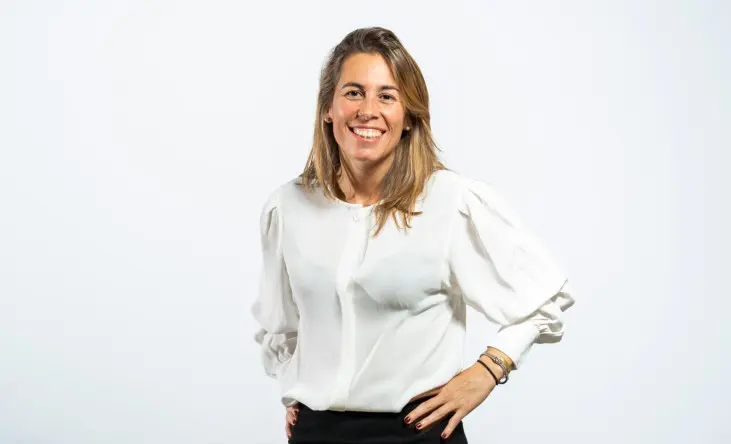HEALTH | 22.09.2020
“Corporate well-being is no longer just about the physical or emotional side of it, it also includes relationships with people, the environment and new ways of working”

Marta Villalba
A graduate in Sports Science, Beatriz Crespo Ruiz (Ciudad Real, 1985) is one of a handful of people in the world with two PhDs; one in Sports Performance and the other in Medicine. Following her studies, she spent seven years working at the Paraplegic Hospital in Toledo, with a focus on neurophysiology, robotics and exoskeletons. A trainer of trainers, university lecturer and included on the list of the 2018 Top 100 Women Leaders in Spain, she founded her own company—Freedom and Flow Company—in 2014, aimed at Small Data for people management.

In her entrepreneurial role, she is a data analyst who specializes in corporate health and well-being. Together with her team, she has developed her own methodology to drive corporate health at all levels (Healthy Box) and created the first platform to measure organizations’ well-being (The Wellbeing Score). She is a member of the European Commission Focus Group on Artificial Intelligence and an honorary member of the IICEFS (Instituto Internacional de Ciencias del Ejercicio Físico y la Salud — international institute of physical activity and health sciences).
Dedicated to innovating and investigating how health, well-being and technology impact the workplace, she has seen developments in employee care in the last five years. During this time, the occupational risk prevention model — with a series of regulations obliging companies to meet minimum requirements to protect occupational health and safety — was shifting to a health promotion model in which companies were no longer just complying with this regulation because they had to, but they also started to “proactively create well-being programs for workers as a way to increase productivity, attract talent, build loyalty and compete as a ‘best company to work with,'” says Beatriz Crespo.
In this new framework, companies began to purchase solutions for nutrition, physical exercise and mindfulness, etc. Although according to Beatriz Crespo, they were not working because they were too generic. These actions and programs “had generated engagement, had responded in some way to attracting talent and to the companies’ need to be positioned as top employers, but they were not reducing health risks. Moreover, absenteeism at work was at a record high in Spain in 2018, rising to 5.3 percent.” Beatriz Crespo says that all this also coincides with a paradigm shift in the work environment: digitization. This leads to the emergence new ways of working and “employees are asked for new technical skills, which, in many cases, ramps up the pressure.”

The last two years have seen workplace well-being take a giant leap forward in companies with the introduction of data analytics tools. These tools enable health and well-being programs to be customized according to health-related social determinants (anything to do with health). Measuring these parameters leads to a shift toward sustainable, data-based models that are efficient and can be adapted to the context of the workforce, not to the general context of individuals.
“Corporate well-being no longer only addresses physical and psychosocial emotional factors, but also includes relationships with the environment, new ways of working and social well-being; in other words, how we feel about relationships with other people and our professional, personal and digital environments. So far, this has not been considered because there was no way to measure it,” says Beatriz Crespo.
The uncertainty caused by the pandemic is one such health-related social determinant that Beatriz Crespo refers to. And as a result, it is accelerating the adoption of these tools within companies, where the intangible concept of corporate well-being is no longer the responsibility of human resources or medical services. Instead, “it has become a strategic objective of the company to ensure happiness and COVID-19 prevention measures and to standardize remote working without losing productivity,” explains Beatriz Crespo.
Using data analysis solutions, employees receive a report with a customized action plan. Aggregate data constantly measures the impact of deployment, monitors progress and how people interact with those actions. All of this, according to this expert, shows future behavior trends and not so much past behavior, as was evaluated with climate surveys.
“There is a lot of diversity in lifestyles and how people are coping with COVID-19, and that’s why corporate well-being strategies need to be highly customized. Not only is the company evaluated, but each person is offered what they need at the time. This data analysis-based approach is predictive, preventative and proactive.”
Beatriz Crespo reassures us that these tools do not compromise employee data — in accordance with EU regulations and in addition to other measures, data is anonymized and an encryption process is followed. Neither the company nor ‘Freedom and Flow’ can match personal data. The data collection step is outsourced and the company only receives aggregate data.
“An employee who feels in a state of complete well-being is much more productive. What corporate well-being has to guarantee is a state of personal, collective and social well-being.”
MAPFRE is committed to this idea. That is why the company is so determined to create a healthy working environment where employees can work in the best physical, mental and social conditions. The company’s commitment to health is reflected in its global campaigns to raise awareness and help create healthy living habits.
All of these actions are carried out in response to world health statistics and the strategies established by the World Health Organization (WHO) and other international bodies.
